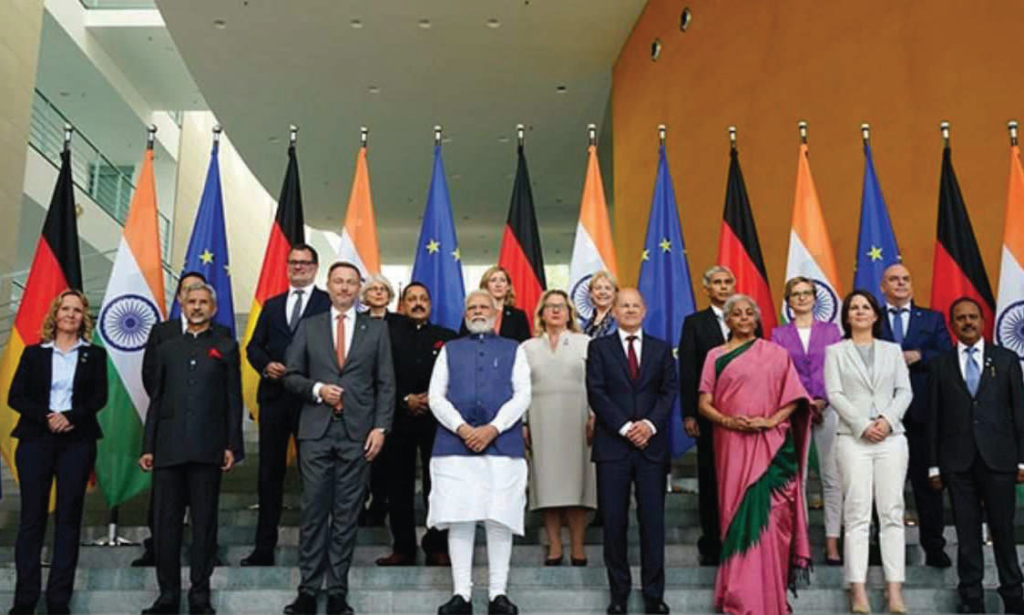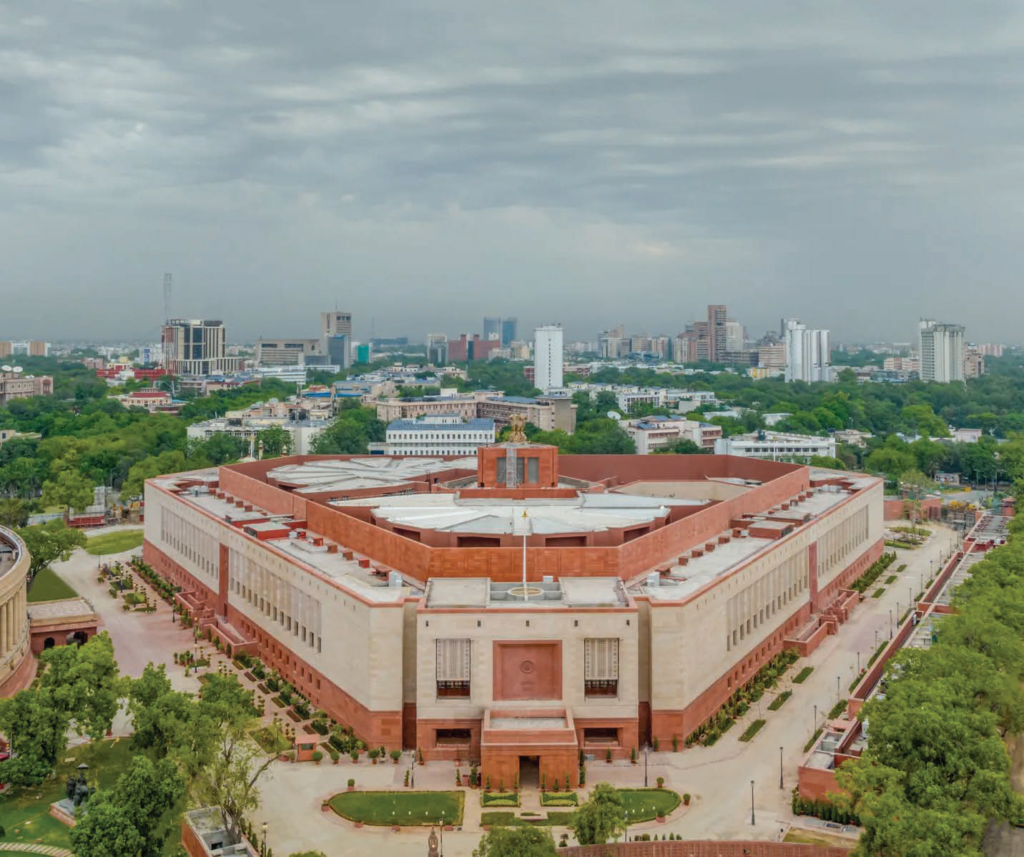Prime Minister Modi commends India’s scientific achievements, including the successful Chandrayaan 3 mission, and emphasizes the nation’s unity and global recognition in a heartfelt address to Parliament.
By EOK Correspondent
In a poignant and historic address, Prime Minister Shri Narendra Modi took the floor during the Special Session of Parliament in Lok Sabha on the 18th of this week, marking a pivotal moment in India’s parliamentary history. The Special Session, which spans from the 18th to the 22nd of September 2023, was graced with the Prime Minister’s reflections on the occasion. PM Modi Celebrates India’s Parliamentary Journey
Prime Minister Modi commenced his speech by emphasizing the significance of the day, as it provided an opportunity to commemorate the 75-year-long parliamentary journey of India. He noted that this cherished history was intricately connected to the Old Parliament Building, which served as the Imperial Legislative Council before India’s independence and later as the Parliament of India. Importantly, he underscored that the construction of this historic edifice, though initiated by foreign rulers, was ultimately realized through the unwavering dedication, hard work, and resources of the Indian populace.
During his address, Prime Minister Modi emphasized the rich legacy of the Parliament, which has evolved over 75 years, fostering valuable conventions and traditions. He expressed confidence that, even as they transition to a new building, the spirit of the Old Parliament would continue to inspire generations to come, serving as a golden chapter in India’s democratic journey.
Highlighting India’s recent achievements and the global recognition they have garnered, particularly with the successful Chandrayaan 3 mission, Prime Minister Modi credited these accomplishments to 75 years of parliamentary history and collective efforts. He conveyed the nation’s compliments to the scientists responsible for this achievement.

Prime Minister Modi also touched upon India’s international engagement, recalling the success of the NAM summit and G20 underlining that these achievements were a testament to the unity and diversity of India.
Amidst these celebrations, the Prime Minister acknowledged that there were skeptics who doubted India’s capabilities. However, he stressed that the G20 Declaration and a roadmap for the future had been forged, firmly asserting India’s presence on the global stage during its G20 Presidency.
Looking ahead, Prime Minister Modi expressed India’s intent to maximize its G20 Presidency until the end of November, supporting the Speaker’s proposal to hold a P20 Summit (Parliamentary 20) under his leadership.
In a nod to India’s rich cultural heritage and values, Prime Minister Modi invoked the concept of ‘Vishwa Mitra,’ highlighting India’s role as a global friend. He attributed this reputation to the nation’s enduring values, rooted in ancient wisdom from the Vedas to Vivekananda, and the inclusive mantra of “Sabka Saath Sabka Vikas.”
The Prime Minister drew an analogy between Parliament’s transition to a new building and a family moving to a new home. He acknowledged the diverse range of emotions the Old Parliament had witnessed and how these memories were a shared heritage of all its members. He underscored the significance of this occasion as an opportunity to pay respect to the common citizens of India.

Reflecting on his personal journey from a humble background to becoming the Prime Minister, he expressed gratitude for the love, respect, and blessings he had received from the nation. He cited the Upanishad sentence inscribed on the gate of Parliament, highlighting the importance of opening doors for people to attain their rights, a principle validated by both current and past members of the House.
Prime Minister Modi recognized the evolving composition of the House, becoming more inclusive over time, with representatives from all sections of society. He lauded the contributions of women parliamentarians in elevating the dignity of the House and shared statistics on the number of public representatives, especially women, who have served in both Houses.
In his address, Prime Minister Modi emphasized the familial atmosphere of the House, where despite disagreements and sarcasm, bitterness never lingered. He commended the dedication of members who continued to perform their duties even during the challenging times of the pandemic.
He recalled the initial doubts about India’s viability as a new nation and credited the strength of Parliament for dispelling those doubts. He paid tribute to the pivotal role played by Presidents, from Dr. Rajendra Prasad to Shri Ramnath Kovind, in enriching the House with their addresses.
Prime Minister Modi also highlighted the transformative leadership of past Prime Ministers, including Pandit Nehru, Lal Bahadur Shastri, Atal Bihari Vajpayee, and Manmohan Singh. He mentioned their significant contributions to the nation and the need to celebrate their achievements. Additionally, he acknowledged the role of other prominent figures, including Sardar Vallabhbhai Patel, Ram Manohar Lohia, Chandra Shekhar, and Lal Krishna Advani, who enriched parliamentary discussions and amplified the voices of common citizens. He also recognized the speeches of foreign leaders in the House, reflecting their respect for India.

The Prime Minister paid tribute to the tragic losses of three Prime Ministers – Nehru Ji, Shastri Ji, and Indira Ji – while they were still in office, acknowledging their enduring impact on the nation.
Prime Minister Modi also praised the skillful management of the House by various Speakers, who provided reference points through their decisions. He highlighted the contributions of 17 Speakers, including two women – Shri Mavlankar, Smt. Sumitra Mahajan, and Shri Om Birla – in leading the House and fostering inclusivity. He expressed gratitude to the Parliament staff for their dedicated service.
Remembering the 2001 terrorist attack on Parliament, the Prime Minister emphasized that it was not just an assault on the building but an attack on the very soul of India, a sentiment echoed in his tribute to the brave individuals who stood between the terrorists and the House.
Prime Minister Modi acknowledged the invaluable role played by journalists in reporting Parliament’s proceedings over the years, even in the absence of advanced technology. He recognized that bidding farewell to the Old Parliament would be particularly challenging for them, as they have been an integral part of the establishment.
Drawing a parallel to the concept of a pilgrimage site, where constant incantations create a sacred aura, Prime Minister Modi stated that the echoes of the 7,500 representatives who have graced the Parliament over the years have turned it into a pilgrimage site, even if discussions were to cease.
He highlighted historical moments in the House, such as Bhagat Singh and Battukeshwar Dutt’s valor during the British rule, the iconic “Stroke of Midnight” speech by Pandit Jawaharlal Nehru, and Atal Bihari Vajpayee’s famous speech underscoring the importance of the survival of India’s democracy.
Prime Minister Modi reflected on the first Council of Ministers, mentioning Baba Saheb Ambedkar’s incorporation of global best practices. He also praised Baba Saheb’s visionary water policy during his tenure in the Nehru Cabinet. He noted Dr. Syama Prasad Mukherjee’s contribution as the first Industry Minister, highlighting the importance of industrialization for the empowerment of Dalits.
The Prime Minister recounted Lal Bahadur Shastri’s inspirational leadership during the 1965 war and his role in laying the foundation for the Green Revolution. He also credited Smt. Indira Gandhi for her leadership in supporting Bangladesh’s independence and her resilience during the emergency and the subsequent resurgence of people’s power.
He mentioned Charan Singh’s leadership in forming the Ministry of Rural Development and the reduction of the voting age from 21 to 18 in the House. Prime Minister Modi touched upon PV Narasimha Rao’s economic reforms during a challenging period for the nation, Atal Ji’s “Sarva Shiksha Abhiyan,” the establishment of the Tribal Affairs Ministry, and the advent of the nuclear age under his leadership. He also mentioned the “Cash for Votes” scandal that unfolded in the House.
The Prime Minister highlighted the historic decisions taken in the House, including the abrogation of Article 370, the introduction of GST, One Rank One Pension (OROP), and the reservation of 10 percent for the economically disadvantaged.
In conclusion, Prime Minister Modi expressed his confidence that the members would transition to the new building with zeal and enthusiasm. He thanked the Speaker for providing the opportunity to reminisce about the House’s historical moments in a positive light, underscoring the immense pride and significance of the occasion for the 7,500 representatives who have contributed to India’s parliamentary legacy.

Leave a Reply